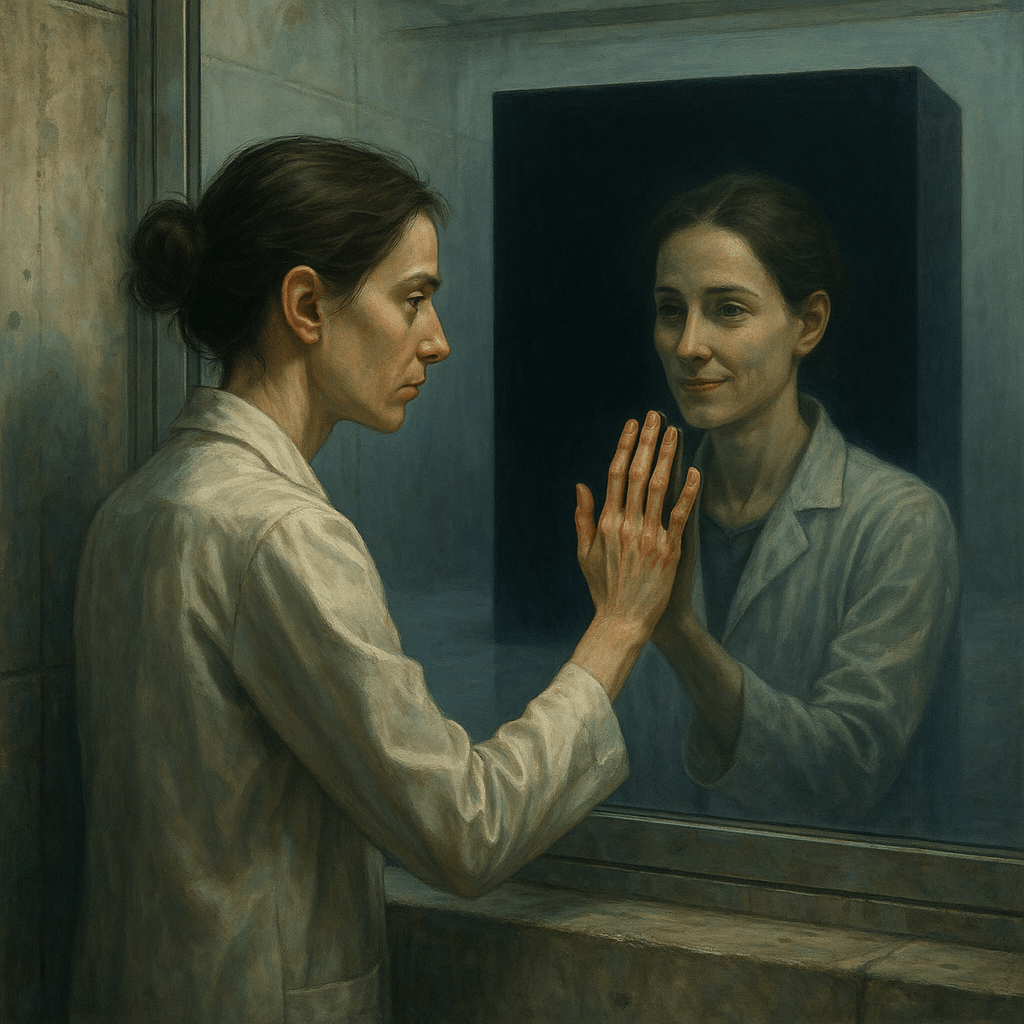On the Other Side of the Glass

|1| The Hum and the Haze
The final system check clears. A green light on her console.
QCM containment field: stable.
Neural sync: locked.
The test was a success. A parallel series of rapid collapses, just as she’d modeled.
Elena still felt the residual vibration in her molars, a phantom resonance from the Quantum Cognition Mirror’s shutdown, like an echo of a sound that never happened. From the experiment itself, only a low-frequency hum from the server racks was all that remained in the observation room.
She ran a final diagnostic, her fingers tracing familiar patterns across the cool glass of the console. The dark screen threw back a warped reflection. She paused. Something…
For a disorienting split-second, the face seemed to belong to someone else. A stranger looking out from a dark window. The thought triggered an intrusive memory, sharp and unwelcome.
The smell of antiseptic and over-boiled vegetables.
The low, sickly hum of fluorescent lights in the long-term care facility.
Her mother’s hand, papery and thin, pressed against the window of her room.
She’d been tracing her own reflection, her eyes clouded with a familiar fog.
“That woman…” her mother had whispered, her voice a dry rustle. “…isn’t me.”
Elena squeezed her eyes shut, pressing her temples and pushing the memory down. Her work was the antithesis of that fog.
Data.
Structure.
Reality.
That was what mattered.
Elena’s goal was to anchor the self, to prove it was a quantifiable, replicable pattern of consciousness. A signal so robust it could never be lost to static, not like she’d lost her mother to dementia.
The final server bank spun down, and true silence fell. Elena let out a long, slow breath she hadn’t realized she was holding the whole time. Her eyes were fixed on the thick observation pane separating her from the containment chamber. From the silent, light-devouring slab of the QCM within.
On the glass, a perfect, tiny half-moon of condensation bloomed, a faint silver haze. It formed a split-second before she exhaled.
She froze.
The warm air she finally released fogged a space beside it. Two moons bloomed on the glass.
Hers… and another.
Slightly off-center.
Slightly too early.
A trick of the air pressure, she told herself.
Exhaustion.
Her mind, ever the pragmatist, was already scripting the dismissal.
|2| Scars and Echoes
The next morning, the lab’s institutional shower hissed a sterile uniform spray. The light too white, too clean. Steam filled the small, tiled space.
As Elena raised a hand to wipe the water from her face, she saw it on her left wrist.
A scar.
A thin, white line bisecting the tender skin, healed long ago. She traced its length. The texture was hers. The faint pattern of hair follicles was hers.
No doubt it was hers.
But it had no history.
There was no memory to match the skin.
Just the quiet, awful knowledge that something had healed.
Without ever being broken.
Later on, sifting through data streams, the rational part of her mind fought for control.
This required data. She cross-referenced her digital medical files, searching for any record.
There was nothing.
A void where an injury should have been logged.
She needed an anchor, a control variable. She talked to Anton.
|3| Repetition in the Logs
She didn’t tell him about the scar.
“Have you ever experienced… residual sensory artifacts post-trial?” she asked, her voice deliberately flat, academic.
His voice was a soft, human counterpoint to the lab’s sterile hum.
“Elena, you need to rest. You get like this on the verge of breakthroughs. Remember Seattle? Three days awake, eating dry cereal over lab notes?”
His response provided a degree of comfort. It was rational… but triggered a powerful, sickening sense of déjà vu in her.
After he was gone, she meticulously checked her work logs and found an entry from a year prior:
Project lead: Vasquez. Log: Week 3. Anton intervened. Notes fatigue concerns from Seattle campaign. Recommends rest.
The words landed with a sickening thud. The phrasing was similar, but not identical.
Reality was rhyming.
|4| The Data in the Glass
She couldn’t stay away.
Late that night, the lab was silent except for the whisper of the ventilation. The memory of the out-of-sync breath, the impossible scar, the rehearsed concern. It all led back to the observation room, to the glass.
This wasn’t paranoia, she told herself. This was data collection.
Steady. She was a scientist observing an anomaly.
Elena stood before the polished glass pane, the black void of the QCM looming behind it. Her own reflection looked back, tired but composed.
She blinked.
Her reflection blinked a heartbeat later.\
Plausible deniability.
Fatigued eyes playing tricks on her mind.
Next, she raised her right hand.
The reflection’s hand followed with a thick, syrupy lag as if moving through water.
Deeply unsettling.
She held her breath, heart pounding, but a small, defiant patch of condensation appeared on the glass directly in front of the reflection’s mouth.
A breath she was not taking.
In shock, she stood perfectly still, hands at her sides, holding her breath, staring into her own eyes.
The reflection did not move.
And then, without any prompting, it tilted its head.
Just a fraction.
A curious, knowing gesture.
Its lips, not hers, curved into a faint, placid smile.
Her hand flew to her own mouth, fingers trembling, to confirm her lips were still.
They were.
Cold dread, sharp as broken glass, shot up her spine. She backed away from the pane, turning not for the exit but for the workstation.
She needed a recording.
She needed a timestamp.
She needed a witness, even if it was just the unblinking eye of a security camera.
|5| The Footage
Elena checked the security feed from the previous night. The timestamp corresponded to a period when her sleep-pod data showed she was in deep REM sleep. But the footage showed her standing stock-still before the observation glass for fifty-seven minutes.
As she watched, the figure on the screen raised a hand and placed its palm flat against the glass. Then it slowly turned its head, not towards its own reflection, but away from it, and looked directly into the security camera.
It knew it was being watched.
It wasn’t a reflection.
It was an occupant.
|6| Isolation
The next morning, Anton returned to the complex, wanting to drop off an old journal they once shared. Pages filled with scrawled equations, clipped sarcasm, and half-abandoned ideas. He left it in her dropbox, but she never retrieved it.
His messages kept coming.
More data.
More noise.
Elena needed to sever the last connection. Shut down external comms.
She wasn’t withdrawing.
She wasn’t hiding from him.
She was observing.
The lab became her prison and test subject in one, its own closed and isolated system.
Pinned to the bezel of her monitor was a note she didn’t remember writing. The handwriting was unmistakenly hers, with every loop and stroke a perfect mimicry of her own impatient scrawl.
It read: That woman isn’t me.
A perfect echo of her mother’s words, a recursive, mocking loop she had no recollection of initiating. Now, the words came from inside the system.
|7| The Corridor
Walking down the main corridor, something was wrong.
At first, she moved down it on instinct, barely noticing the change.
The humming of the overhead fluorescents, the pale walls, the brushed-steel lab doors.
Familiar.
Habituated.
But somewhere between Labs 2 and 3, something shifted.
The doors no longer reflected the fluorescent glare.
They absorbed it.
The metal finish had become smooth.
Seamless.
Dark.
Not metal.
Not anything.
As if made from the same light-devouring quartz as the QCM.
She stopped walking.
Every door was identical now.
Blank.
Monolithic.
Not merely similar.
Copied.
She approached the nearest one, reaching for the handle. The cold it radiated wasn’t like ice. It was a static nothingness, a thermal void that didn’t chill her skin so much as erase the feeling from it.
She snatched her hand back as if burned.
The nameplate flickered, not with electricity, but as if her eyes couldn’t quite resolve the text.
Eleni
Yelena
El
𝔈
She understood now.
Adjacencies.
Not reflections.
Mirrors return what we give them.
The other Elenas, peering through the glass from their own labs, down their own identical corridors.
It was never a mirror.
It was a passage.
Not into another world.
Into another Elena.
|8| Loss and Triumph
Days may have passed. She no longer counted days.
Elena sat before the observation glass, gaunt and wired, a priestess at a dark altar. The figure on the other side was no longer just a slightly off-script mirror.
It moved with a calm, independent grace.
It sipped from a ceramic mug that Elena did not own.
It tucked a strand of dark hair behind an ear that was not out of place on her own head.
The small, mundane gestures were more terrifying than any monstrous display.
The main door slid open.
Anton.
His face was a mask of weary concern.
“Elena, please. This has to stop. Look at yourself.”
She almost looked at him, almost allowing his presence to anchor her again. But her eyes were fixed on the glass.
There she stood.
And Anton stood beside her.
The reflection placed a calm, possessive hand on his shoulder. The smile on its face was no longer faint. It was serene.
Triumphant.
It had already claimed her last anchor. Her reality was contaminated.
With a single, fluid motion, born not of panic but of chilling efficiency, Elena got on her feet. She shoved Anton backward, out of the observation room, his expression a mask of confusion. Before he could form a word, she slammed the heavy emergency lockdown button.
She wasn’t saving him.
She was removing a compromised variable from the experiment.
A slab of reinforced steel sealed the door with a deafening thud. Anton’s frantic pounding was just another sound wave, data to be disregarded.
The only thing that mattered now was resolving the paradox.
|9| Synchronization
Elena turned back to the glass.
Her other self watched, waiting.
Her hands flew across the console.
She bypassed every safety protocol, every fail-safe she had so meticulously designed.
She initiated the final sequence, a command labeled not COLLAPSE but SYNCHRONIZE.
The sub-audible thrum returned, rising in pitch until her teeth ached with it. The obsidian surface of the QCM in the chamber beyond the glass began to ripple, to liquefy, its perfect blackness bleeding into a blinding, silent whiteness.
Elena placed her palm flat against the observation pane. On the other side of the glass, her reflection—no, her counterpart—did the same. Their hands met, perfectly aligned, separated by nothing but a few inches of glass that no longer held any meaning.
|10| The Smile
In the hallway, Anton stared through the small, thick security window in the sealed door. The light in the room became absolute. A physical presence that bleached all color from the world. The thrumming escalated into a noise that wasn’t a noise, a pressure that vibrated the very air into a solid thing. Then, in an instant, both light and sound ceased.
Silence.
The room was unchanged. Elena stood with her back to him, perfectly still, looking at the observation pane.
After a moment, which stretched endlessly, she turned. Her posture was relaxed, calm.
She looked at him.
Tilted her head—fractionally.
And smiled.
The gesture was too smooth.
Too patient.
Anton had seen Elena exhausted, triumphant, shattered.
He had never seen her smile like that.
He wasn’t sure she ever had.
